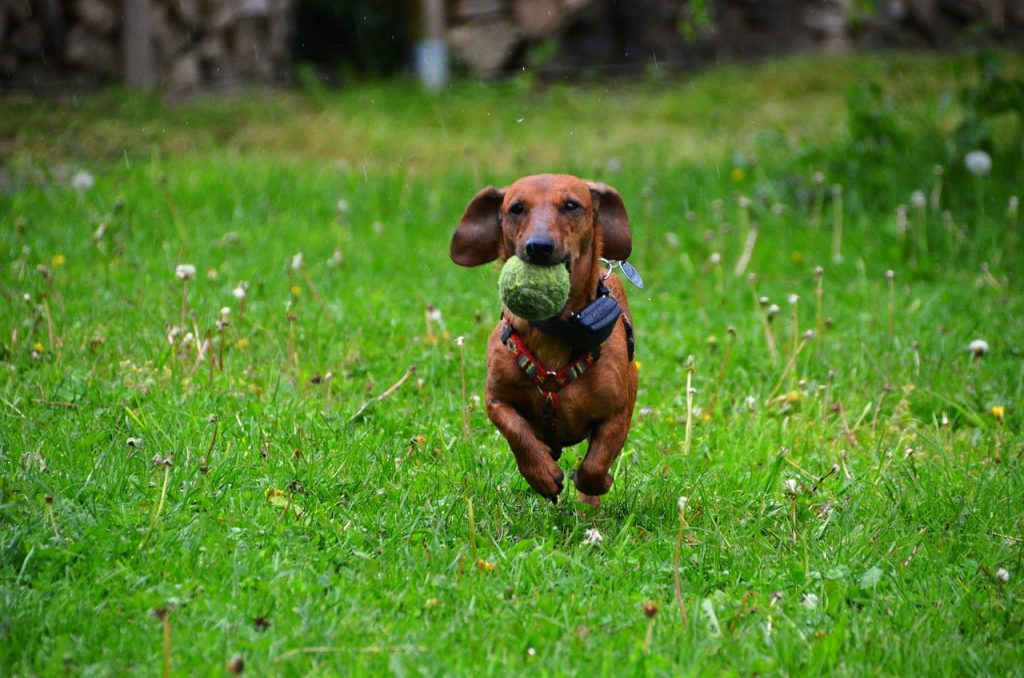Brining a furry little friend into your home is a wonderful way to expand your family, bring more joy into your home, and even save a life when it comes to adopting. However, before you jump right into bringing a Dachshund home, there are some things you should take into consideration.
The number of animals that are retuned to shelters and rescues by unprepared humans is shocking and heartbreaking. This post will help you determine if you’ve got what it takes to offer one of these cuties a forever home.

Dachshund Adoption – The Need To Knows
1. Lifespan
2. Do They Shed?
3. Temperament And Personality
4. Different Types
5. Their Size
6. Dachshund Vs Mini Dachshund
7. Are They Hypoallergenic?
8. Are They Smart?
9. Cost
10. Potential Back Problems
1. Dachshund Lifespan

Typically speaking, this breed has an average lifespan of between 12-16 years. In some cases they can live even longer. In fact, these little fur balls hold a place in the Guinness World records thanks to a cutie named Chanel that lived an astonishing 21 years. Her record was later broken by a mix named Otto who lived even longer.
2. Do Dachshunds Shed?

Truthfully speaking, all dog breeds shed with the small exception of those that are hairless. Shedding is actually an important and natural process that maintains proper skin health and helps regulate body temperature. The good news is that this breed is a light shedder which means you won’t find yourself spending hours upon hours cleaning up after your furry friend’s old fur.
You can minimize the need for brushing and cleaning up messes more by going for the wire-haired variety which sheds even less than the smooth-haired and long-haired varieties.
3. Dachshund Temperament And Personality

These little guys are well known for having a playful and fun personality. However, they can also be quite daring and don’t let their small size get in the way. In some cases, these fur balls may try to act aggressively towards other dogs, even if the dog is much larger than them.
They are also well-known for being extremely loyal to their human once a bond has been formed and it has been made clear who the boss it. However, getting to that point isn’t always easy. This is definitely a breed that you will want to begin training thoroughly and consistently starting from an early age.
Other traits that you should be aware of are their high energy levels, the desire to play on a regular basis, the need to be engaged both mentally and physically, high levels of intelligence, the potential for stubbornness, digging, barking, and the desire to follow their loved ones wherever they go.
4. Dachshund Types

While there are variations in classification for Dachshunds depending on their size and weight, the biggest difference in the types of this breed come down to colors as well as coat type. There are three different types of coats being smooth, long, and wire haired.
These different types of coats come in a variety of different colors and patterns. Popular colors include red, black and tan, cream and black, tan and chocolate, blue and cream, fawn and tan, cream, as well as tan and blue.
There are also three different types of standard color patterns as well as three types of non-standard color patterns.
Standard patterns include dapple, brindle, and sable.
Non-standard patterns include brindle piebald, double dapple, and piebald.
5. Dachshund Size

If you’re looking for a fur baby that’s smaller in size, this could be the right breed for you. Even the largest variety of this breed weighs in between 16-32 pounds. According to the AKC, there is only one official size for a Dachshund which is the standard variety, but they will allow a mature dog weighing less than 11 pounds compete within miniature class competitions. However, breed enthusiasts and many owners beg to differ.
Here are the three different sizes this breed comes in:
Standard (The only classification the AKC recognizes): Dogs from this breed weighing between 16-32 pounds are placed into the standard classification.
Miniature: These little guys weigh in at under 11 pounds upon maturity.
Tweenie: As the name suggests, these fur balls are between the other two classifications. They will weight between 11-16 pounds upon maturity.
6. Dachshund Vs Mini Dachshund

Truthfully speaking, the only real difference between a mini and standard Dachshund is their size. Both classifications share the same health concerns, life expectancy, grooming needs, temperament, personality, training needs, and just about anything else you can think of.
7. Are Dachshunds Hypoallergenic?

The short answer to this question is no. Since Dachshunds shed, they cannot technically be considered a hypoallergenic dog breed. However, many people agree that they are still a good choice for someone with dog allergies because there is a minimal chance of them triggering any adverse reactions.
Keep in mind, dandruff, loose hair, and other issues that can trigger allergies can be kept to a minimal by cleaning and vacuuming your home on a regular basis as well as brushing and grooming your furry friend.
8. Are Dachshunds Smart?

These fur babies are notorious for being incredibly intelligent. In fact, they are so smart that it can lead to behavioral issues if they are not properly trained, get regular exercise, and receive regular attention as well as frequent play time.
9. How Much Are Dachshunds?

Aside from potentially saving a life, there are other reasons why adopting from a shelter or rescue is the way to go. One of the biggest reasons is cost. Believe it or not, the price of purchasing a Dachshund from a breeder can range from $500 to $3,500.
On the other hand, shelters and rescues often have very affordable and reasonable fees. Prices vary depending on location, but fees are typically within the $50-$250 price range.
10. Dachshund Back Problems

One of the main health issues these cute little balls of joy can encounter is a back issue called intervertebral disc disease (IVDD). Unfortunately, if left untreated and allowed to worsen this condition can actually lead to paralysis.
You can avoid this issue by preventing your furry little friend from participating in high impact activities. In addition, another preventive measure you can take is making sure your pup eats a proper diet and maintains a healthy weight.
Frequently Asked Questions:
Can Dachshunds Swim?
This breed can be taught to swim but if you’re looking for a fur ball that will spend hours paddling around with you, you might want to consider a different breed. Due to their extremely short legs, these fur balls struggle when it comes to swimming and will likely never become a strong swimmer. However, they enjoy plenty of other activities so there’s always different ways you and your pup can have fun together.
When Do Dachshunds Stop Growing?
Typically speaking, you can expect your furry friend to reach their mature size and weight at just 8 months old. They may continue to grow slightly after this age, but the growth process significantly slows down.
Are Dachshunds Easy To Train?
Dachshunds are an intelligent breed of dog and they pick up on commands quite easily. However, their intelligence can sometimes lead to stubborn behaviors but this can be overcome with enough patience, determination, and repetition.
Are Dachshunds Good With Cats?
In short, there’s no clear answer for this question since each dog is a little different. The good news is that in most cases the answer is yes. Dachshunds and cats do tend to get along well and some even become close friends.
Are Dachshunds Good Family Dogs?
Many families would agree that their Dachshund made a wonderful addition to their home and their family. They are trainable, loyal, compassionate, and tend to do quite well with children when treated properly. Also, even though they are small in size, they also make incredible watch dogs.







